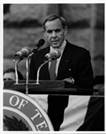1987 Philip Morris initiates a six-year effort for “tort reform” in Texas. In essence, the bill provides the tobacco companies with retroactive protection: It claims that, if customers are forewarned by a label of a product’s danger, the company cannot then be held responsible after purchase–thus relieving tobacco companies of liability to diseased smokers. According to one Philip Morris lobbyist, the company’s Washington operatives, coordinating the Texas effort, are repeatedly heard to remark, “We’ll pay whatever’s necessary.”
Philip Morris initiates a six-year effort for “tort reform” in Texas. In essence, the bill provides the tobacco companies with retroactive protection: It claims that, if customers are forewarned by a label of a product’s danger, the company cannot then be held responsible after purchase–thus relieving tobacco companies of liability to diseased smokers. According to one Philip Morris lobbyist, the company’s Washington operatives, coordinating the Texas effort, are repeatedly heard to remark, “We’ll pay whatever’s necessary.”
Working through a front group, the Texas Civil Justice League, Philip Morris lobbyists use family and political connections to entice Lt. Gov. Bob Bullock to broker a deal in the Texas Senate removing tobacco, liquor, and firearms from the list of actionable products. The victory costs cigarette companies $5 million to $10 million, in exchange for the “biggest gift any legislature has ever given the tobacco industry,” according to one critic of the deal, who also blasts Bullock for accepting campaign funds from the industry. Bullock’s spokeswoman replies that the $7,500 he had taken is peanuts compared to what others have accepted.
1988
Philip Morris is an early contributor to black causes. One company official suggests, “The real issue isn’t smoking against nonsmoking–it’s discrimination against intolerance.” Officials like former California Assembly Speaker Willie Brown (now the mayor of San Francisco), who took $200,000 from tobacco companies over a five-year period, offer other rationalizations: “I’m not concerned about smoking–it’s not my issue. I’m concerned about substance abuse.”
Other black leaders, however, understand their community’s vulnerability to the smoking peril and begin speaking out. Reed V. Tuckson, commissioner of public health for the District of Columbia, labels the tobacco industry’s philanthropic programs among blacks a “predatory strategy” with the sole goal of making money: “They go to the people of color; they go to women; they go to the poor.. . . There is a meanness to this greed that is unprecedented in its intensity, tenacity, and consequences. It is unjustified by any standard of humanity.”














